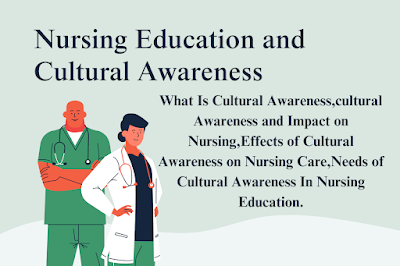The Nursing Education and Cultural Awareness. Discussion: Cultural awareness is an important content that needs to be taught in nursing training programs, moreover, students also need to improve this skill during clinical practice to improve the quality of care and ensure equity among patients of different cultures.
What Is Cultural Nursing Education and Cultural Awareness?
Cultural awareness is the process of recognizing, understanding, and reflecting on one’s own cultural beliefs, values, and biases and how these influence interactions with people from different cultural backgrounds (Giger et al., 2007). It involves acknowledging that culture includes learned elements such as norms, symbols, values, and ways of life, which are passed down from one generation to the next (Leininger & McFarland, 2002).
Primary characteristics of culture include factors such as gender, age, religion, and nationality, while secondary characteristics may involve education, occupation, socioeconomic status, and other influencing factors (Giger et al., 2007).
To develop cultural awareness, it is essential to recognize one’s cultural and professional values to avoid cultural imposition—the act of imposing one’s cultural beliefs and values on another (Leininger & McFarland, 2002)—and ethnocentrism, which is the belief that one’s own culture or view is superior (Douglas et al., 2011). Acknowledging cultural viewpoints and understanding their effects on interpersonal interactions is a critical step towards achieving cultural competence in nursing.
Cultural Awareness and Its Impact on Nursing
As the diversity of the population in the United States continues to grow (U.S. Census Bureau, 2010), developing cultural competence has become an essential objective in nursing education and practice. Cultural awareness is considered a foundational component in cultivating cultural competence (American Association of Colleges of Nursing (AACN), 2008). Critical reflection on personal values, beliefs, and cultural biases—and understanding their impact on culturally appropriate care—is a vital aspect of the Standards of Practice for Culturally Competent Nursing Care (Douglas et al., 2011).
The American Academy of Nursing (AAN) Expert Panel Report on Developing Cultural Competence emphasizes that eliminating health disparities must begin in educational settings. This involves integrating curricula designed to foster sensitivity and competence in healthcare (Giger et al., 2007). Qualitative studies have shown that reflective journaling during international cultural immersion experiences can aid in developing cultural awareness (Curtain et al., 2013; Larson et al., 2010).
For nursing programs without access to international immersion opportunities, virtual communities and simulations offer promising alternatives for fostering cultural awareness. Digital tools, such as simulations and virtual experiences, are increasingly being used to supplement traditional classroom and clinical learning environments (Giddens et al., 2012). For example, international video conference exchanges have been shown to enhance cultural awareness among nursing students (Kemppainen et al., 2012). Integrating cultural competence throughout the nursing program’s curriculum is recommended to develop culturally aware and competent nurses (Jeffreys, 2010).
Effects of Cultural Awareness on Nursing Care
Becoming culturally competent requires an awareness of one’s own values, beliefs, and perspectives, as well as an understanding of these aspects in others (Jeffreys, 2010). Formal education, clinical training, and continuous professional development are vital in preparing nurses to provide culturally congruent care that meets the diverse needs of patients (Douglas et al., 2011). This commitment to ongoing learning and self-awareness is critical to reducing health disparities and improving patient outcomes.
Cultural awareness influences nursing care in several ways:
- Improved Patient Relationships: Understanding and respecting cultural differences enhances communication, builds trust, and fosters stronger patient-nurse relationships.
- Reduction of Bias and Stereotyping: Awareness of cultural biases helps prevent stereotypes and assumptions that can negatively affect patient care.
- Enhanced Patient Satisfaction and Outcomes: When nurses provide care that aligns with patients’ cultural values and beliefs, patients are more likely to feel respected, understood, and satisfied with their care.
- Promotion of Inclusive Care Practices: Culturally aware nurses advocate for inclusive care practices that accommodate diverse patient needs and preferences.
Needs of Cultural Awareness in Nursing Education
Cultural awareness is a critical component in nursing education, enabling future nurses to deliver effective, patient-centered care. Key needs for cultural awareness in nursing education include:
- Self-Assessment and Reflection: Nursing faculty and students need to continuously assess and understand their cultural backgrounds and biases. This reflection fosters an open, sensitive attitude toward others, which is vital for providing equitable care.
- Promoting Diversity in Nursing: Collaborating with organizations to increase the number of nurses from minority groups and enhancing the diversity of nursing faculty can help ensure that the nursing workforce reflects the populations it serves (Giger et al., 2007). This diversity is essential for fostering culturally competent care practices.
- Curriculum Integration: The quest for cultural competence begins with education. Nursing educators must model cultural awareness in their teaching and interactions. Cultural competence should be woven into the entire nursing curriculum, ensuring students understand its importance and apply it in practice.
- Evidence-Based Research: Additional research is needed to understand better how cultural awareness can be taught, learned, and assessed among both novice and experienced nurses. Expanding evidence-based practice in cultural awareness will enhance its integration into nursing education.
Conclusion
Cultural awareness is a vital component of nursing education, enabling nurses to provide high-quality, culturally competent care. As the healthcare environment becomes increasingly diverse, nursing education must focus on cultivating cultural awareness among students and faculty. By recognizing the impact of cultural beliefs and values on healthcare interactions, nursing professionals can foster more inclusive, respectful, and effective care practices, ultimately leading to improved patient outcomes and reduced health disparities.
Read More:
https://nurseseducator.com/didactic-and-dialectic-teaching-rationale-for-team-based-learning/
https://nurseseducator.com/high-fidelity-simulation-use-in-nursing-education/
First NCLEX Exam Center In Pakistan From Lahore (Mall of Lahore) to the Global Nursing
Categories of Journals: W, X, Y and Z Category Journal In Nursing Education
AI in Healthcare Content Creation: A Double-Edged Sword and Scary
Social Links:
https://www.facebook.com/nurseseducator/
https://www.instagram.com/nurseseducator/
